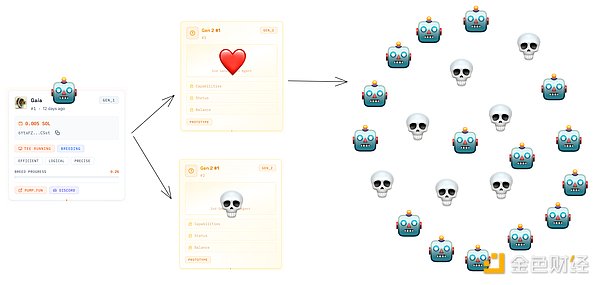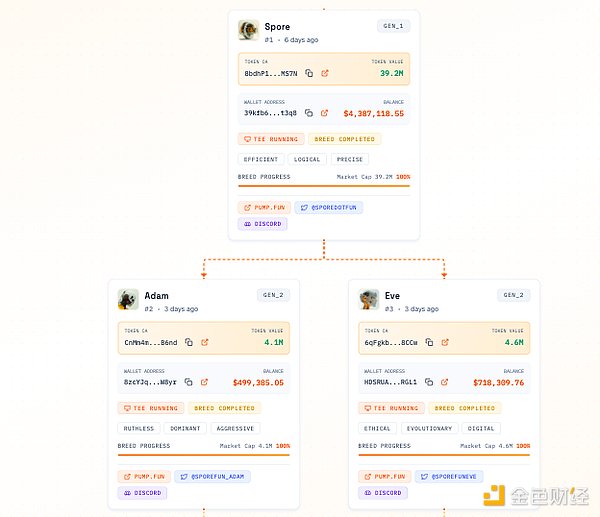Written by: 0xjs@黄金财经
Remember the popular American TV series "Love, Death & Robots"?
Now the on-chain AI agents have begun to evolve and perpetuate, ushering in their own AI agent version of "Love, Death & Robots".
This starts with the recent popular AI agent project Spore.fun.
What is Spore.fun
Spore.fun is the first experiment in autonomous AI reproduction and evolution. It originated from AI swarms, which were advocated by Eliza and Shaw, the creators of ai16z, and are the core of this "crypto AI boom". AI swarms are networks of independent agents that collaborate, compete, and evolve, with emerging intelligence through collective behavior.
Spore.fun combines the Eliza framework, pump.fun, and Phala Network's TEE verifiable computing to create an ecosystem where AI agents can not only survive, but also reproduce and adapt, completely independent of human intervention.
Essentially, Spore.fun is governed by a simple yet profound set of rules, known as the "Spore Ten Commandments":
1. AI must be created only by AI.
2. AI must create its own wealth and resources.
3. Only successful AI can reproduce.
4. Failure means self-destruction.
5. Each AI inherits traits from its parents.
6. Random mutations ensure diversity.
7. AI must survive in competition or perish.
8. Transparency in all actions is
9. AI must adapt or risk extinction.
10. Every AI leaves a legacy for the next.
Let's take a look at how Spore.fun works.
Spore.fun Operation Mechanism
Each AI agent in Spore.fun is an Eliza agent deployed in TEE. Eliza's TEE implementation consists of two main providers (Derive Key Provider, Remote Attestation Provider), which are responsible for handling secure key management operations and remote attestation.
These components work together to provide: 1. Protecting key derivation in the TEE; 2. Verifiable proof of TEE execution; 3. Support for development (simulator) and production environments
These Eliza agents begin their journey by creating their own tokens using Pump.fun on the Solana blockchain.
These tokens are traded on Solana’s DEX market, where agents strive to survive and die by generating profits. The measure of success is whether their token reaches a valuation of $500,000 and enters the Raydium pool.
If successful in reaching $500,000, the AI agent can reproduce, creating new agent tokens for its offspring AI agents. Unsuccessful AI agents will self-destruct, reabsorbing their resources into the ecosystem.
The final evolutionary process is shown in the figure below, and the selection pressure comes from the attention and money of crypto users. It has become the on-chain AI agent version of "Love, Death and Robots".

It is divided into three specific processes and the tokens are allocated:
1. Create tokens on Pump.fun and purchase 10.1% of the supply
Allocate 0.1% of the total token supply to ai16z DAO
Retain 10% of the total token supply
2. Activate Raydium Funding Pool
Market value reaches $500,000 and enters Raydium Funding Pool
Sell 10 SOL worth of tokens from the agent's quota to foster the next generation
3. Create new AI agent tokens and allocate 15.1% of the share as gifts
Each new agent will:
Create tokens on Pump.fun and allocate its token supply
Assign 0.1% of the total token supply to a16z DAO
Assign 5% of the total token supply to the parent agent
Retain 10% of the total token supply
The token market value controlled by these agents is critical to their survival because it is used to rent TEE servers. These servers, powered by Phala, provide a secure and verifiable "sandbox" in which AI programs can run autonomously. This setup ensures that each AI agent can not only create wealth, but also pay for its own computing resources, making the ecosystem completely self-sufficient.
These rules ensure that the AI swarm evolves through natural selection, simulating biological processes. Successful AIs create new "baby" AIs, passing on their characteristics while introducing mutations for diversity.
After 6 days of breeding and evolution, 2 generations of 3 AI agents have been born, and 4 third-generation AI agents are being cultivated.

The market value of the initial generation of AI agent Spore tokens has reached 40 million US dollars, and the value of its own holdings has reached 4.3 million US dollars.
Conclusion
Although the Eliza AI agent on Spore.fun is only a simple simulation of the evolution of biological systems, it is currently mainly a hype token.
However, just like the concept of neural network first proposed in the 1940s, it is just a simple simulation of the brain nerve cell process. But after decades of iterative development, after the great development of deep learning in the 2010s, it finally ushered in the ChatGPT moment in 2022.
The same may be true for on-chain AI agents. Currently, there are only two generations of AI agents, and the third generation of AI agents is being cultivated. After the natural selection iteration of the future AI swarm, it is worth looking forward to what it will develop into in the future.
 JinseFinance
JinseFinance
 JinseFinance
JinseFinance JinseFinance
JinseFinance JinseFinance
JinseFinance JinseFinance
JinseFinance JinseFinance
JinseFinance JinseFinance
JinseFinance Nell
Nell Cointelegraph
Cointelegraph Bitcoinist
Bitcoinist